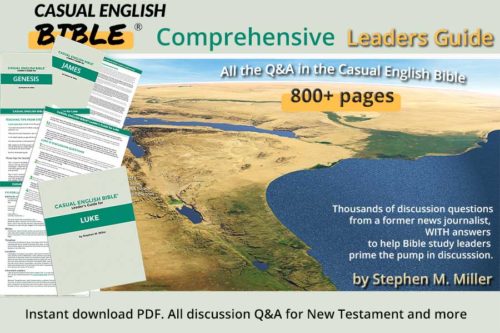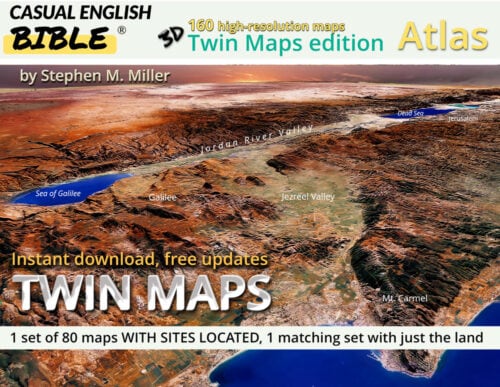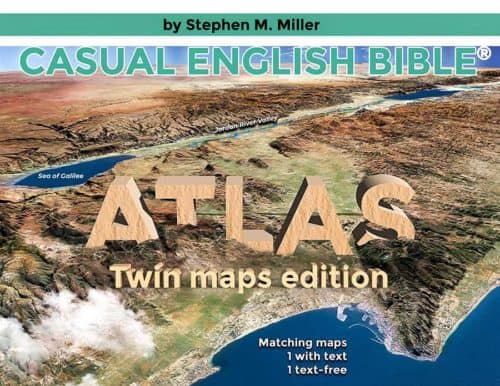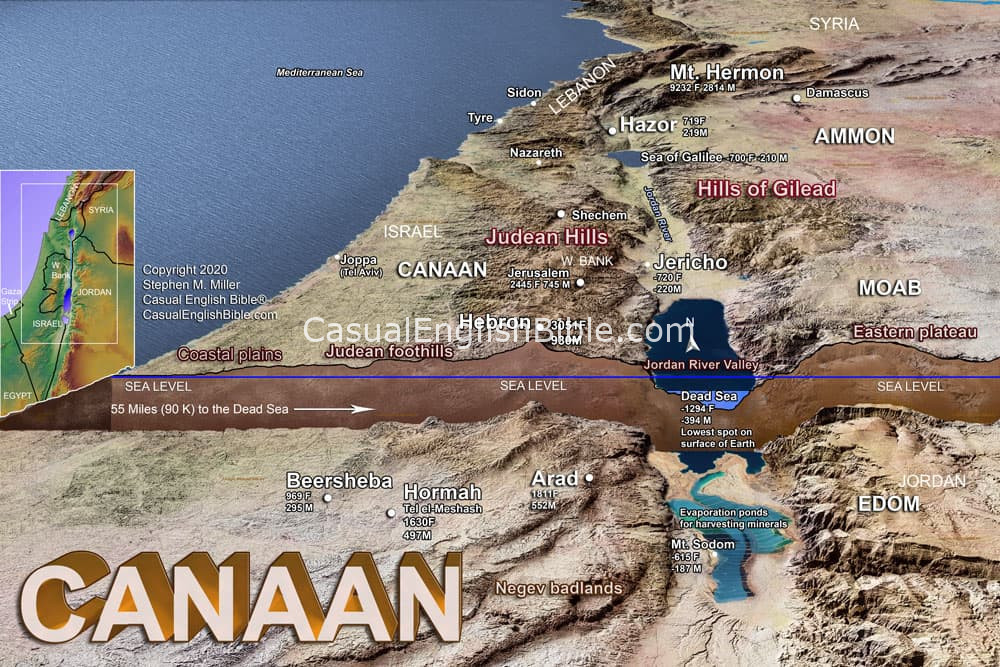Judges 1
Israel’s conquest settles for less
Judah’s tribe takes lead
1After Joshua died, the Israelites asked the LORD a question: “Who’s going to lead us now? We still have to fight the Canaanites.” 2The LORD said, “The tribe of Judah. I’m giving them the job of leading the fight for the land.” 3Judah’s tribal leaders met with leaders from their neighboring tribe of Simeon. They said, “Let’s join forces and fight the Canaanites together. You help us take land assigned to us and we’ll help you get your land.” Simeon’s leaders agreed.King with no thumbs
4Judah’s coalition army defeated Canaanites and Perizzites, killing 10,000 at the battle for the city of Bezek. 5The city’s ruler, Adoni-bezek [1] was there for the battle. Israelites defeated his forces, the Canaanites and the Perizzites. 6Adoni-bezek tried to escape. But the Israelites ran him down, caught him, and cut off his thumbs and big toes. [2] 7The ruler said, “God knows I deserve this. There was a time I cut off the thumbs and toes of 70 rulers. I had them eating leftovers and scraps from my meals. God is paying me back for that.” He was taken to Jerusalem and died there. [3]Jerusalem dead and burned
8Judah’s army captured Jerusalem, killed the people, and burned the city. [4] 9After that, the army marched south. They fought Canaanites who lived in the hills, the low regions, and the dry Negev territory. 10Judah’s army attacked Canaanites living in the hill city of Hebron, formerly known as Kiriath-arba. They defeated the warriors of Sheshai, Ahiman, and Talmai. 11Next, they fought the people of Debir, formerly Kiriath-sepher.12That’s when Caleb decided to motivate his men by saying, “Whoever captures this city of Kiriath-sepher gets to marry my daughter Achsah.” [5] 13Caleb’s nephew won the prize—Othniel, son of Caleb’s little brother Kenaz. Caleb did what he promised. He gave his daughter Achsah to Othniel as a wife.
14After the two got married, Achsah told her husband he should ask Caleb to give them some land. Later, Achsah asked for it herself. She went to see her father. [6] As she got off the donkey Caleb said, “What’s going on? Is something wrong?” 15“Yes,” she said. “You gave us some pretty dry land there in the Negev. Could you also give us some land with spring water?” Her dad did just that. He gave them some highland land with springs and some lowland territory with springs. He gave them water high and low.
Kenites settle in with the locals
16Kenites were a community of people descended from the father-in-law of Moses. They left Jericho when the people of Judah did and went with them south into the Judean desert. The Kenites eventually settled in with local Amalekites who lived in and around the Negev city of Arad. 17Tribal armies of Judah and Simeon captured the city of Zephath and killed everyone they captured. [7] They renamed the city Stilled. [8] 18Judah’s coalition army took the cities and surrounding territories of Gaza, Ashkelon, and Ekron. [9] 19Judah’s army also took and held the hill country. But they didn’t drive out the people living in cities on the western plains. Israelites enemies there rode in iron chariots. [10] 20Caleb got Hebron, as Moses ordered. Caleb drove out the locals, the families of Anak’s three sons.Jerusalem back from the dead
21Benjamin’s tribal warriors couldn’t drive out the Jebusite people who lived in Jerusalem. Jebusites still live there today. 22Ephraim’s [11] tribe, descended from Joseph, attacked and took the city of Bethel, with the LORD’s help. 23They had help from spies, too. The tribe had sent the men to scout the city, formerly known as Luz. 24When they got there, they convinced a local man to show them how to get into the city. They told him, “Show us the way in and when this is all over, we’ll show you some kindness.” 25The man pointed the way into Bethel. Israelites took the city, killed the people, and released the man who helped them, along with his family. 26The man moved north to Hittite territory, where he planted a town that he named after the one he left behind: Luz. It’s still there today.Living with the locals
27Manasseh’s tribe failed to drive out the locals living in several cities and their outlying communities: Beth-shan, Taanach, Dor, Ibleam, Megiddo. Canaanites held on to those areas.28Later, the Israelites stopped killing or running off the defeated Canaanites. Instead, they kept them as slaves. 29Ephraim’s tribe left Canaanites in the city of Gezer, and lived alongside them. 30Zebulun’s tribe lived alongside Canaanites in the cities of Kitron and Nahalol. 31Ashur let locals live in the towns of Sidon, Ahlab, Achzib, Helbah, Aphik, and Rehob. 32The people of Ashur lived among those folks. 33Naphtali’s tribe let the locals stay in Beth-shemesh and Beth-anath. But those people served as Naphtali’s slaves.
34Amorite warriors on the coastal plain not only stopped the tribe of Dan. They pushed Dan back into the hills. 35Still today, Amorites live in the towns of Har-heres, Aijalon, and Shaalbim. But Ephraim’s tribe made them work as slaves. 36The boundary between Amorite land and Ephraim extended from the climb up Scorpion Pass [12] to Sela and the hills beyond.
Footnotes
Adoni-bezek might have been the ruler’s name. But “adoni” mean’s “lord” or “ruler.” So, the term might have meant “ruler of Bezek.”
The writer doesn’t say why the Israelite ancestors of today’s Jewish people did such a barbaric thing. Conquerors sometimes did this to defeated rulers to humiliate them and make it hard for them to do important things like hold a sword or pop a top on a wineskin. Who’s going to follow a king who can’t fight, fiddle, or dance a victory jig? The writer lets the defeated ruler offer his own insight into why he lost thumbs and toes: payback (1:7). Perhaps the Israelites knew about the king’s vicious treatment of others. So, they gave him a dose of his own medicine. That’s a wild guess.
It’s unclear who took him to Jerusalem. Maybe the Israelites took him in an attack on the fortress. Or maybe his people rescued him and took him to safety in this well-fortified city on the crest of a hill. There’s no indication the Israelites ever took possession of it and moved in until David’s men captured it centuries later and declared it the capital of his kingdom of Israel. Benjamin’s tribe couldn’t dislodge the Jebusites living there (1:21).
Apparently, survivors came back and rebuilt the city (1:21).
We’re left to wonder what the daughter thought about that. But this was a patriarchal age when men did the thinking, and sometimes the stinking. On the other hand, if a woman has to marry someone her father chooses, it might as well be a brave Israelite military hero. Although there’s no indication he was brave enough to ask his father-in-law for that extra land the new wife wanted (1:14).
This is speculation. It’s because she got off a donkey. It doesn’t literally say she went to see him. She might have gone out for a donkey ride, and when she got back her dad was there on a visit. But that seems less likely.
The Hebrew word for what the Israelites did to the city is herem. Some Bibles say they “devoted” it to destruction. Scholars describe herem as a “curse of war” or a “ban.” It means that when soldiers conquer a city, for example, they are banned from keeping anything for themselves—everything in the city is under the curse of war and must die. Joshua fought by those rules. His orders at the Battle of Jericho: “Keep yourselves from the things devoted to destruction, lest when you have devoted them you take any of the devoted things and make the camp of Israel a thing for destruction and bring trouble upon it” (Joshua 6:18 English Standard Version).
In Hebrew, the name is Hormah, which seems to mean “destroyed.” And some say it was apparently intended also to sound at least a little like the word they used to describe the complete annihilation of everyone and everything that lived in a community: herem. See note above. Herem/Hormah, Killed/Stilled. That’s the idea.
Those later became Philistine cities. In about the 1200s BC, the Philistines, a fierce fighting people, settled in the area with migrating invaders known as Sea Peoples. They apparently came from islands or coastal areas of the Mediterranean Sea, possibly from Crete.
Horse-drawn iron-plated chariots were the ancient equivalent of today’s armored tank. They terrified infantry because a fast-moving chariot drawn by a team of horses could plow a path right through a line of foot soldiers. Chariots didn’t have that advantage in the hill country, however. And many scholars say those hills are where Joshua and the Israelites initially concentrated their invasion efforts.
Ephraim is presumed. The Hebrew says the “family of Joseph.” Joseph’s family produced two tribes: Ephraim and Manasseh. But Ephraim was the tribe in charge of clearing out Canaanites in Bethel.
“Scorpion Pass” is Akrabbim in Hebrew. Some Bibles use that Hebrew name. Today, it runs along a steep and winding part of Route 227 in the eastern Negev desert of Israel. Sela’s location is unknown.
Discussion Questions
- Sorry, there are currently no questions for this chapter.











